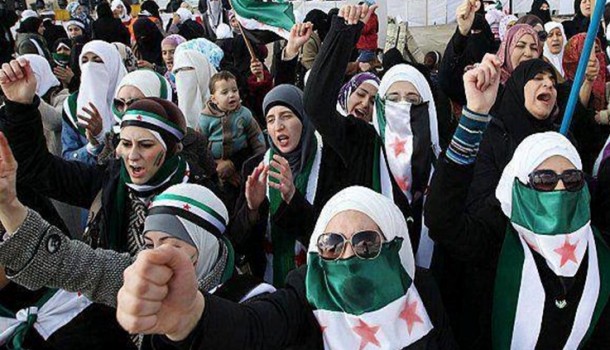The Syrian government has allowed aid convoys to cross only one of eight border crossings identified by the United Nations as a priority, Western ambassadors said.
In February, the Security Council passed the first humanitarian resolution of the three-year civil war, demanding that the government and armed opposition allow aid to reach civilians.
But in the first progress report a month on, UN humanitarian chief Valerie Amos said the situation had only deteriorated and she demanded blanket, unhindered access to affected populations.
"Conflict and violence has intensified," Amos told reporters after the closed-doors session.
Only six percent of the population living in besieged areas had received assistance in the last month, she said.
Since February 22, 300 cases of sexual violence have been recorded in and around Damascus alone, and hundreds of thousands more Syrians had been newly displaced, Amos added.
A piecemeal approach is ineffective and rising need demands unhindered access and a streamlined procedure.
"Spending days and weeks negotiating to get one inter-agency convoy is a waste of valuable time," Amos said.
The United States said the Syrian government had "utterly failed" to comply with the UN Security Council resolution and remained the biggest obstacle to the delivery of aid.
Syrian government officials use administrative snares to cripple UN field missions, repeatedly hold up convoys and remove medical supplies from convoys, US ambassador Samantha Power said.
Power said 3.5 million people could be reached "literally with the stroke of a pen" if the Syrian government allowed UN convoys in through other border crossings.
"It is the government alone that is denying the UN access across these checkpoints," she said.
Britain and the United States said they would be working with the rest of the Security Council on what further steps could be taken to ensure compliance, though they would not be drawn on specifics.
"What we are seeing is a pattern of arbitrary denial of access in violation of international humanitarian law and despite the Council's demands," British ambassador Mark Lyall Grant said.
Of 220,000 Syrians living under siege, 80 percent remain besieged by the Syrian government and of the total only 14,000 have been reached in the last month, Britain said.
The figure of 3.5 million people, none of whom have had access in the last month, had increased by one million since January 1, the British ambassador added.
"We need a blanket approval, a systemic, systematic change of approach by Damascus," Grant said.
Luxembourg, the rotating president of the Security Council, said the resolution had seen little to no progress.
"The situation has only continued to worsen," Luxembourg ambassador Sylvie Lucas told reporters.
But Syria hit back against the avalanche of criticism and warned against the "moral bankruptcy" of the United Nations, blaming foreign terrorists as responsible for the massacres of Syrian civilians.
"We have a serious problem ladies and gentlemen, which is the secretariat and some member of the Security Council, they don't want to hear the truth because some of them are deeply involved in instigating terrorism in Syria," said envoy Bashar Jaafari.
Human Rights Watch has called on the United Nations to take punitive measures against Damascus for failing to comply with the aid access resolution, including an arms embargo.
The International Rescue Committee said Syria's failure to implement the resolution was "a tragedy for the Syrian people".
"What we need now is full implementation of UNSC resolution 2139 and results on the ground. Without that, we will fail Syrians in need," said regional director Mark Schnellbaecher.
------------------------------------------------------------
In February, the Security Council passed the first humanitarian resolution of the three-year civil war, demanding that the government and armed opposition allow aid to reach civilians.
But in the first progress report a month on, UN humanitarian chief Valerie Amos said the situation had only deteriorated and she demanded blanket, unhindered access to affected populations.
"Conflict and violence has intensified," Amos told reporters after the closed-doors session.
Only six percent of the population living in besieged areas had received assistance in the last month, she said.
Since February 22, 300 cases of sexual violence have been recorded in and around Damascus alone, and hundreds of thousands more Syrians had been newly displaced, Amos added.
A piecemeal approach is ineffective and rising need demands unhindered access and a streamlined procedure.
"Spending days and weeks negotiating to get one inter-agency convoy is a waste of valuable time," Amos said.
The United States said the Syrian government had "utterly failed" to comply with the UN Security Council resolution and remained the biggest obstacle to the delivery of aid.
Syrian government officials use administrative snares to cripple UN field missions, repeatedly hold up convoys and remove medical supplies from convoys, US ambassador Samantha Power said.
Power said 3.5 million people could be reached "literally with the stroke of a pen" if the Syrian government allowed UN convoys in through other border crossings.
"It is the government alone that is denying the UN access across these checkpoints," she said.
Britain and the United States said they would be working with the rest of the Security Council on what further steps could be taken to ensure compliance, though they would not be drawn on specifics.
"What we are seeing is a pattern of arbitrary denial of access in violation of international humanitarian law and despite the Council's demands," British ambassador Mark Lyall Grant said.
Of 220,000 Syrians living under siege, 80 percent remain besieged by the Syrian government and of the total only 14,000 have been reached in the last month, Britain said.
The figure of 3.5 million people, none of whom have had access in the last month, had increased by one million since January 1, the British ambassador added.
"We need a blanket approval, a systemic, systematic change of approach by Damascus," Grant said.
Luxembourg, the rotating president of the Security Council, said the resolution had seen little to no progress.
"The situation has only continued to worsen," Luxembourg ambassador Sylvie Lucas told reporters.
But Syria hit back against the avalanche of criticism and warned against the "moral bankruptcy" of the United Nations, blaming foreign terrorists as responsible for the massacres of Syrian civilians.
"We have a serious problem ladies and gentlemen, which is the secretariat and some member of the Security Council, they don't want to hear the truth because some of them are deeply involved in instigating terrorism in Syria," said envoy Bashar Jaafari.
Human Rights Watch has called on the United Nations to take punitive measures against Damascus for failing to comply with the aid access resolution, including an arms embargo.
The International Rescue Committee said Syria's failure to implement the resolution was "a tragedy for the Syrian people".
"What we need now is full implementation of UNSC resolution 2139 and results on the ground. Without that, we will fail Syrians in need," said regional director Mark Schnellbaecher.
------------------------------------------------------------









 Home
Home Politics
Politics











